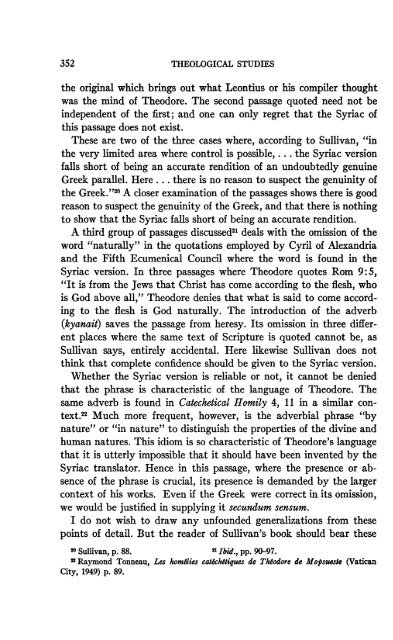ANNOTATIONS ON THE CHRISTOLOGY OF THEODORE OF ...
ANNOTATIONS ON THE CHRISTOLOGY OF THEODORE OF ...
ANNOTATIONS ON THE CHRISTOLOGY OF THEODORE OF ...
Create successful ePaper yourself
Turn your PDF publications into a flip-book with our unique Google optimized e-Paper software.
352 <strong>THE</strong>OLOGICAL STUDIES<br />
the original which brings out what Leontius or his compiler thought<br />
was the mind of Theodore. The second passage quoted need not be<br />
independent of the first; and one can only regret that the Syriac of<br />
this passage does not exist.<br />
These are two of the three cases where, according to Sullivan, "in<br />
the very limited area where control is possible,. . . the Syriac version<br />
falls short of being an accurate rendition of an undoubtedly genuine<br />
Greek parallel. Here .. . there is no reason to suspect the genuinity of<br />
the Greek." 20 A closer examination of the passages shows there is good<br />
reason to suspect the genuinity of the Greek, and that there is nothing<br />
to show that the Syriac falls short of being an accurate rendition.<br />
A third group of passages discussed 21 deals with the omission of the<br />
word "naturally'' in the quotations employed by Cyril of Alexandria<br />
and the Fifth Ecumenical Council where the word is found in the<br />
Syriac version. In three passages where Theodore quotes Rom 9:5,<br />
"It is from the Jews that Christ has come according to the flesh, who<br />
is God above all," Theodore denies that what is said to come according<br />
to the flesh is God naturally. The introduction of the adverb<br />
(kyanait) saves the passage from heresy. Its omission in three different<br />
places where the same text of Scripture is quoted cannot be, as<br />
Sullivan says, entirely accidental. Here likewise Sullivan does not<br />
think that complete confidence should be given to the Syriac version.<br />
Whether the Syriac version is reliable or not, it cannot be denied<br />
that the phrase is characteristic of the language of Theodore. The<br />
same adverb is found in Catechetical Homily 4, 11 in a similar context.<br />
22 Much more frequent, however, is the adverbial phrase "by<br />
nature" or "in nature" to distinguish the properties of the divine and<br />
human natures. This idiom is so characteristic of Theodore's language<br />
that it is utterly impossible that it should have been invented by the<br />
Syriac translator. Hence in this passage, where the presence or absence<br />
of the phrase is crucial, its presence is demanded by the larger<br />
context of his works. Even if the Greek were correct in its omission,<br />
we would be justified in supplying it secundum sensum.<br />
I do not wish to draw any unfounded generalizations from these<br />
points of detail. But the reader of Sullivan's book should bear these<br />
20 Sullivan, p. 88.<br />
21 Ibid., pp. 90-97.<br />
22 Raymond Tonneau, Les homilies caticMtiques de ThSodore de Mopsueste (Vatican<br />
City, 1949) p. 89.
















